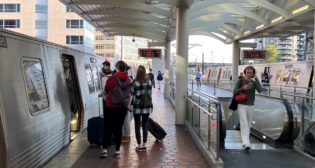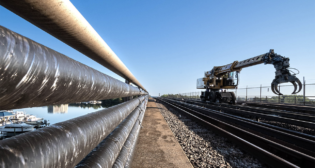
BART move triggers First Amendment spat
Written by William C. Vantuono, Editor-in-ChiefIn an effort to curtail or thwart political disruption through electronic means, BART may inadvertently have triggered a backlash of concern over freedom of speech, which could result in court action.
 BART is defending its decision last Thursday to cut off cell service at the site of an expected trackside protest, and its long-standing ban on "expressive activities" inside the fare gates. But the decision may run afoul of a 1967 California Supreme Court ruling that found a city (and presumably, a city or regional transit agency) couldn’t prohibit nondisruptive political activity inside a railroad station.
BART is defending its decision last Thursday to cut off cell service at the site of an expected trackside protest, and its long-standing ban on "expressive activities" inside the fare gates. But the decision may run afoul of a 1967 California Supreme Court ruling that found a city (and presumably, a city or regional transit agency) couldn’t prohibit nondisruptive political activity inside a railroad station.
By cutting off an entire mode of communication, “you’re shutting down much more speech than could possibly be related to a protest," according to Michael Risher, an American Civil Liberties Union lawyer. If BART is concerned about passenger safety, he said, its focus should be to "prevent the violence, not the speech.”
BART said preventing violence was its intent as it temporarily interrupted cell phone service at downtown San Francisco stations Thursday, following reports and rumors that organizers planned to use mobile phones to coordinate a demonstration over a police shooting of a man with a knife on July 3.
BART said longstanding rules forbid all assemblies, demonstrations, or "other expressive activities" inside any fare gates. Demonstrations are allowed outside the gates with a permit, which must be obtained a week in advance.
“The paid areas are for people getting on and off trains,” BART spokesman Jim Allison said. “Allowing a free rein of activities in that area would present an unreasonable danger.”



